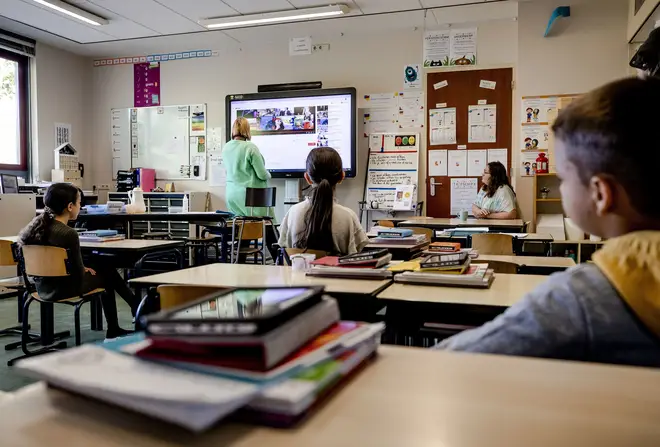
Tom Swarbrick 4pm - 6pm
12 May 2020, 16:05

Maintaining social distancing is “simply impossible to achieve” in many primary schools if they reopen next month, the leader of the headteachers' union has warned.
Paul Whiteman, general secretary of the National Association of Head Teachers (NAHT), said there are a number of "difficulties" with the Government's guidance on safely reopening schools by June 1.
He told MPs that the school leaders' union was not consulted on specific plans, announced in recent days, to admit pupils in Reception, Year 1 and Year 6 from June 1.
Mr Whiteman said it is hardest to maintain social distancing, as well as good hygiene levels, with the younger year groups.
Addressing a virtual Education Select Committee, Mr Whiteman added: "If social distancing is as we understand it now - the two metre rule to be applied in schools - there are very many schools that are saying it is simply impossible to achieve."
It comes after the Department for Education (DfE) issued guidelines on Monday which said primary school class sizes should be limited to 15 pupils and outdoor space should be utilised.
Listen to this short clip of @PaulWhiteman6 responding to @CommonsEd questions about relaxing the lockdown in schools #edselctte pic.twitter.com/UJay2DOErf
— NAHT (@NAHTnews) May 12, 2020
The advice calls for schools to stagger lunch and break times, as well as drop-off and pick-up times, to reduce the number of pupils moving around.
It adds that schools should also consider introducing one-way circulation, or placing a divider down the middle of the corridor.
But Mr Whiteman said schools would struggle to accommodate the advised 15 pupils in their classrooms.
He said: "Our members are telling us that their building sizes on average would only accommodate classes of 10 to 12, rather than 15.
"So straight away we're getting into some real practical difficulties about whether the Government's ambition can be practically accommodated.
"Let alone all the fears that parents have about bringing their children back into school, and the fears of the workforce too."
We have published guidance for education and childcare settings to prepare for welcoming more children back on 1 June.
— Department for Education (@educationgovuk) May 11, 2020
This includes information on why we’ve chosen these year groups and what the latest science tells us.https://t.co/awemmDckan
He told MPs that there "isn't enough understanding of the scientific basis" for the return to schools next month for confidence to exist among parents.
His comments came after the Government announced its ambition for all primary school pupils in England to go back to school for a month before the summer.
The Government expects children to be able to return to nurseries and childcare settings, and for Reception, Year 1 and Year 6 pupils to be back in school, from June 1 at the earliest.
Jenny Coles, president of the Association of Directors of Children's Services (ADCS), also expressed concerns about the June 1 date during the committee hearing, adding that a five or six-week lead in time was needed to prepare for a return to school.
She told MPs: "Getting that parental confidence, in terms of a phased return to school, will need a lot of work by central Government, local communities and local government.
"This is not going to be something that's going to be fixed by June 1. It's going to take a lot of weeks and a lot of work to do that."
Listen & subscribe: Global Player | Apple Podcasts | Google Podcasts | Spotify
Rebecca Long-Bailey, Labour's shadow education secretary, said: "There is still no realistic guidance for how social distancing will be kept in place with the age groups that will return first, how staff and families of children will be protected, or how class sizes of 15 will be achieved with the resources schools have.
"The Government must urgently convene education unions and the profession to create a workable plan for the reopening of schools when the science indicates it is safe to do so and which has the confidence of all those affected."
Speaking today about parents who are worried about sending their children back to school, Health Secretary Matt Hancock said: "This is also completely natural.
"The reason we've said what we have is actually because homeschooling and telly schooling for five- and six-year-olds, in Year 1 and in Reception, is much harder.
"We do want to make sure that education is interrupted as little as possible. Also, childcare is much more difficult if you've got a five-year-old, six-year-old or a child in pre-school."
On proposals to reopen primary schools to some year groups by June 1, the minister added: "We think, as long as the rate of new cases keeps coming down, we think it is okay to make this small change in the first place. But we'll keep a very, very close eye on it.
"The most important message we want to get over to parents is that it is safe for your child at school."